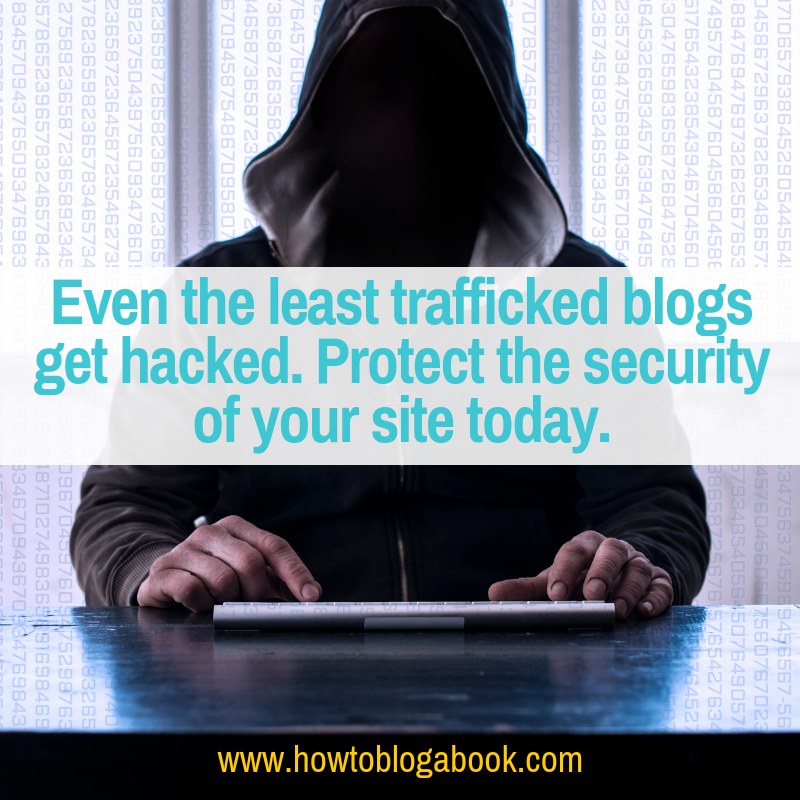If you’ve ever been hacked or seen a website that has been hacked, you know how scary it can be. But there are ways to avoid letting hackers take over your blog. To help you secure your site, Beth Bauer (@JourneyofBethB) offers some easy—but essential—tips for keeping the hackers at bay.
I had a client with a popular website for expats that sent me assignments for posts on a regular basis. One day the requests just stopped. I waited a couple of weeks and then decided to check the website to see what new articles they were posting. I got an error message. I sent an email to my contact, and he responded that the blog had been hacked. Weeks turned into months, and eventually, they just gave up trying to recover their data. It was too expensive and time-consuming.
The same thing could happen to you if you aren’t careful.
Why You Could Get Hacked
Perhaps you are wondering why anyone would bother to hack your website. You might think you’re too insignificant to get the attention of hackers, but that’s a dangerous belief. I want to dispel this common misconception. Hackers probably don’t want to mess with your design or bring your site down. More likely, they want to access your server and use it to relay spam, or they may intend to set it up as a temporary web server for illegal files.
So, no matter how big or small your site, you want to do what you can to keep it safe from hackers. To accomplish that goal, here are some important tips on how to avoid being hacked.
Check and Change Your Passwords
When was the last time you changed your password? It may seem like a no-brainer, but sometimes we get lazy and forget important things like changing our passwords.
Hacker scripts and software that attempt at guessing username and password combinations are responsible for thousands of daily attacks across the worldwide web. Strong passwords are not only necessary for online financial transactions but are also critical for your website server and e-mail.
Make sure all of your passwords are a combination of upper and lower case alphanumeric characters and symbols and are at least ten characters long. Also, be careful not to use the same password for everything.
Use SSL
In July of this year, Google released an updated version of the popular web browser Chrome that marked websites without SSL certificates as “not secure.” Other browsers adopted the same policy.
Not long after that, I tried to log into my site to create a post, and I got an error message saying that my website was not secure. I couldn’t access it all! I called my web hosting company, and fortunately, it was a simple fix. They just had to turn on my SSL certificate.
SSL (which is an acronym for Secure Sockets Layer) is the best practices standard security technology for web browsers. Websites with SSL certificates appear in your browser’s URL as “HTTPS.” Those without it appear as “HTTP” (without the S).
SSL helps to keep a safe, secure connection for your website keeping customers’ information safe from hackers, criminals and other unwanted people. HTTPS guarantees that people are communicating with the intended server.
Here’s another benefit of SSL: Google has announced that it will automatically boost websites in search rankings that use HTTPS.
Don’t Upload Unknown Files
One of the most common ways to get hacked is to upload unknown files or open an attachment from an unknown source. Almost daily on my website, I get comments like these “… here are some hyperlinks to sites that we link to because we believe they are worth visiting,” or “I hope you all are having a great week. I’m trying new methods to find more links. Check out my site to see the results.” Never open these types of comments!
In fact, just copying and pasting these comments from my website to Word caused me all kinds of problems. It is best to delete these types of comments and never respond or open the embedded links. The same rule applies to opening attachments.
Update Your Software
Hacking is typically done by automated scripts that scour the Internet and attempt to exploit known security issues in common software. That is why software companies are always releasing updates. They are trying to stay ahead of the hackers and keep their software secure. So, if you see updates available, use them.
Trying to keep your website secure and updated can be a bit of a hassle, but it’s not near the amount of trouble you’ll have if your site gets hacked. Ask anyone that’s had the horrific experience of not being able to access their website, e-mail, or worse—like having malicious files sent to all of their contacts, and they will tell you to do whatever you can to keep your site secure. A few minutes of prevention can go a long way towards a blogger’s peace of mind.
Do you have other tips that have helped you avoide getting hacked? Tell me about them in a comment below.
About the Author
 Beth Bauer is a freelance writer, travel blogger, yoga instructor, and entrepreneur currently working on her third novel. She has traveled to over 20 countries in just the last two years and enjoys life as a digital nomad. She is originally from the Pacific Northwest of the U.S.A., and when she’s home lives on the Long Beach Peninsula with her dog, Ozzie.
Beth Bauer is a freelance writer, travel blogger, yoga instructor, and entrepreneur currently working on her third novel. She has traveled to over 20 countries in just the last two years and enjoys life as a digital nomad. She is originally from the Pacific Northwest of the U.S.A., and when she’s home lives on the Long Beach Peninsula with her dog, Ozzie.


Thanks for sharing all these useful tips!
Glad I stopped by your blog!